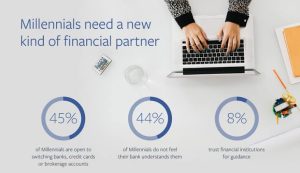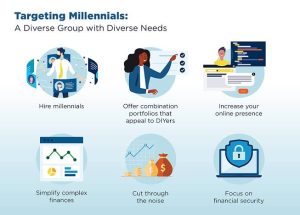Millennials, the generation born between 1981 and 1996, are transforming the financial landscape in a variety of ways. From embracing digital tools to seeking out personalized solutions, they’ve redefined financial planning—and insurance is no exception. With a focus on flexibility, sustainability, and long-term value, millennials are leading the charge in adopting innovative insurance options that reflect their unique values and goals.
This article explores how millennials are reshaping the insurance industry and transforming financial planning through new approaches, products, and priorities.
1. Embracing Digital Insurance Solutions
Millennials are the first generation to fully embrace technology in every aspect of their lives, including how they manage finances and insurance. Unlike older generations who rely on face-to-face meetings with insurance agents, millennials prefer digital platforms that offer convenience and transparency.
Insurtech companies, which leverage technology to offer online quotes, streamlined applications, and instant customer service, are particularly appealing to this generation. Companies like Lemonade and Policygenius provide a user-friendly experience where policies can be compared and purchased in minutes, without the need for paperwork or in-person visits.
For millennials, the ability to manage insurance entirely online fits with their fast-paced, mobile-first lifestyle, allowing them to make informed decisions quickly and conveniently.
2. Prioritizing Flexibility in Insurance Policies
Gone are the days when insurance was a one-size-fits-all solution. Millennials value flexibility in their insurance options, seeking products that can evolve with their changing life circumstances.

Many millennials are opting for term life insurance because it offers affordable coverage for a specific period, which appeals to those who might be uncertain about their long-term financial future. They can revisit their needs as life changes, such as when they get married, have children, or buy a home.
Additionally, insurance products that offer flexible payment plans, or that allow policyholders to adjust coverage levels based on income, health, or life events, resonate with millennials’ desire for customizable financial solutions.
3. Using Insurance for Financial Wellness
Millennials are not just looking for insurance to cover the basics; they’re seeing it as a core part of their overall financial wellness strategy. Life insurance, for example, is increasingly viewed as a financial tool for protecting their future wealth and ensuring long-term stability.
Permanent life insurance policies, such as whole life and universal life insurance, offer millennials the dual benefit of life coverage and cash value accumulation, which can grow over time. This cash value can be borrowed for future financial needs, such as funding a child’s education, buying a home, or supplementing retirement income.
For millennials, these insurance options align with their goal of creating a multi-faceted approach to wealth-building, allowing them to maximize benefits while protecting their financial future.
4. Seeking Out Sustainability and Ethical Insurance Options
Sustainability and corporate responsibility are top priorities for millennials, and they expect the companies they work with to reflect their values. This trend is influencing their choices in insurance as well.
Millennials are more likely to select insurance providers that commit to ethical practices, environmentally sustainable investments, and socially responsible initiatives. Some insurance companies now offer green insurance options or invest in environmental, social, and governance (ESG) projects that millennials find attractive.

This generation isn’t just looking at what the insurance policy offers, but also at how the company behind the policy operates. Brands that can demonstrate their commitment to sustainability and positive social impact are more likely to win millennial customers.
5. Exploring Pay-Per-Use and Microinsurance
Traditional insurance policies often require long-term commitments and large premiums, which may not appeal to millennials who value flexibility and affordability. As a result, pay-per-use and microinsurance have gained popularity among this demographic.
Microinsurance offers coverage for specific, short-term risks, such as travel insurance for a single trip or smartphone insurance for theft or damage. These products provide peace of mind without the need for a long-term contract or high premiums, making them perfect for millennials who may be navigating multiple financial priorities at once.
Pay-per-use auto insurance, like Metromile, allows policyholders to pay based on the number of miles driven, making it a more affordable option for those who don’t drive frequently or rely on ridesharing and public transportation.
6. Leveraging Health Insurance to Protect Financial Stability
Millennials are highly aware of the financial risks that come with unexpected medical expenses. With the rising costs of healthcare, many in this generation see health insurance as an essential part of their financial planning.
Innovative health insurance plans, such as high-deductible health plans (HDHPs) combined with Health Savings Accounts (HSAs), allow millennials to save for medical expenses tax-free while keeping monthly premiums low. This balance between affordable coverage and tax advantages aligns well with millennials’ financial planning goals, offering a smart way to cover healthcare costs while saving for future needs.
Furthermore, telemedicine options, which allow policyholders to consult doctors online, have been embraced by millennials who value both convenience and cost savings. Many insurance providers now include telehealth services as part of their standard health insurance plans, enhancing access to affordable healthcare for this tech-savvy generation.
7. Building Security with Disability and Critical Illness Insurance
In addition to life and health insurance, millennials are increasingly looking at disability insurance and critical illness insurance as essential parts of their financial safety nets.
With many millennials working in the gig economy or pursuing entrepreneurial ventures, traditional job-based benefits, such as employer-provided disability insurance, are not always available. Disability insurance ensures that they have income protection in the event of a long-term illness or injury that prevents them from working.
Critical illness insurance offers a lump-sum payment if diagnosed with a serious illness like cancer or a heart attack, helping millennials cover medical bills or other financial obligations during recovery. These products provide the security millennials need to safeguard their income and avoid financial hardship due to unforeseen health events.
8. Collaborating with Financial Advisors and Insurtech Platforms
Millennials are also rethinking how they seek insurance advice. Rather than relying solely on traditional financial advisors, they are turning to robo-advisors and digital insurance platforms for affordable, tech-enabled guidance.
These platforms offer personalized recommendations based on algorithms that analyze individual financial data, giving millennials the tailored advice they seek without the high cost of working with a financial planner. Robo-advisors and insurtech platforms allow millennials to compare policies, assess coverage needs, and make informed decisions, all from the comfort of their smartphones.
9. Combining Life Insurance with Investment Opportunities
Millennials are increasingly combining life insurance with their broader investment strategies. Indexed universal life insurance (IUL) and variable life insurance (VLI) are attractive options for those who want to benefit from both life coverage and potential stock market gains.
These policies allow millennials to direct a portion of their premiums into investment accounts, offering the possibility of higher returns over time. For a generation that prioritizes financial growth and investment opportunities, these types of life insurance products provide a unique way to balance risk and reward within a single financial vehicle.
10. Advocating for Transparency and Consumer Empowerment
Finally, millennials are advocating for transparency and consumer empowerment in the insurance industry. They want to understand the products they’re buying, how their premiums are being invested, and the fees they might incur. This generation is more likely to switch providers if they feel they are not being given clear, upfront information.
The rise of comparison tools, customer reviews, and educational content from insurtech companies reflects millennials’ desire for more control over their financial decisions. Millennials are transforming insurance not just by the products they choose but by demanding greater clarity and accountability from the companies they do business with.
The Future of Financial Planning for Millennials
As millennials continue to reshape the insurance landscape, their innovative approach to financial planning will likely influence the next generation of products and services. From digital solutions to sustainability-focused options, millennials are leading the charge toward a more flexible, personalized, and values-driven approach to insurance.
By prioritizing financial wellness, embracing technology, and demanding transparency, millennials are not just transforming financial planning—they’re revolutionizing the way insurance fits into modern life. As the industry evolves, it will be exciting to see how millennial-driven innovations continue to shape the future of insurance.
A Lasting Impact on the Insurance Industry
Millennials have already made a significant impact on the insurance industry, and their influence shows no signs of slowing down. As they enter new life stages—such as starting families, buying homes, and advancing in their careers—their need for tailored, accessible, and innovative financial solutions will continue to drive change. Insurance companies are responding to these demands by developing products that meet millennials’ expectations of flexibility, affordability, and transparency.
Moreover, as millennials advocate for ethical and sustainable business practices, insurance providers are increasingly taking steps to align with these values. Companies that fail to meet these expectations will likely struggle to retain millennial customers, while those that prioritize sustainability and social responsibility will thrive in this new era.
The rise of insurtech platforms, microinsurance, and customized policy options are just a few examples of how the industry is adapting to millennial preferences. The emphasis on financial wellness and integrating insurance into a broader strategy for wealth-building is also shaping how insurers approach product design and customer engagement.
What Can Future Generations Learn from Millennials?
Millennials are setting the tone for how future generations will approach financial planning and insurance. Their emphasis on digital solutions, personalized coverage, and social responsibility has raised the bar for what customers expect from the financial services industry.
For Gen Z, the generation following millennials, many of these shifts will already be in place as they begin making financial decisions. Like millennials, they will demand convenience, affordability, and innovation. However, Gen Z may take these trends even further, pushing for even more integrated financial ecosystems where insurance, investments, and banking are managed seamlessly through technology.
As millennials continue to influence the industry, they are laying the groundwork for a new standard in financial planning—one that is flexible, transparent, and aligned with the evolving values of consumers.
Conclusion: Millennials are Redefining Financial Planning with Insurance
Millennials have reimagined financial planning by leveraging innovative insurance options that align with their unique values, lifestyles, and long-term goals. From embracing digital platforms and flexible policies to seeking out ethical, sustainable companies, this generation has transformed how insurance fits into the broader picture of financial wellness.
As millennials continue to prioritize customization, convenience, and transparency in their insurance choices, they are not just changing the industry for themselves but for future generations as well. By blending modern technology with responsible financial planning, millennials have redefined the role of insurance in creating a secure, prosperous future.
Whether you’re a millennial looking to enhance your financial strategy or someone interested in how this generation is transforming the industry, one thing is clear: millennials are leading the way toward a new era of insurance innovation.

